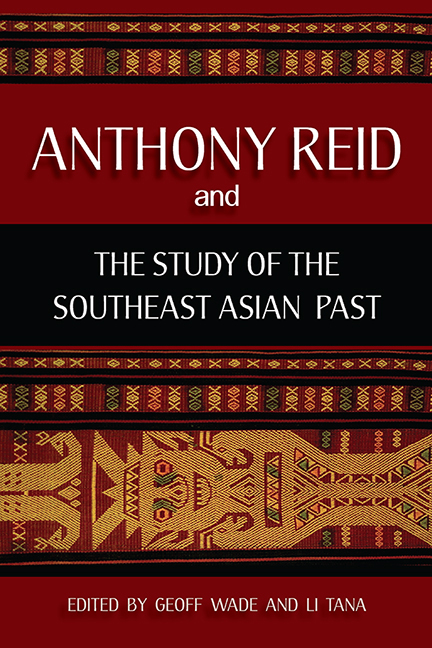Book contents
- Frontmatter
- Contents
- Acknowledgements
- The Contributors
- PART I Introduction
- PART II The Scholarship of Anthony Reid
- PART III Southeast Asia in the World
- PART IV Early Modern Southeast Asia
- 7 Southeast Asian Islam and Southern China in the Fourteenth Century
- 8 Lancaran, Ghurab and Ghali: Mediterranean Impact on War Vessels in Early Modern Southeast Asia
- 9 Weather, History and Empire: The Typhoon Factor and the Manila Galleon Trade, 1565–1815
- 10 Interracial Marriages and the Overseas Family: The Case of the Portuguese Topasses in Timor
- 11 A Note on the Čhām Diaspora in the Ayutthayan Kingdom
- 12 Tongking in the Age of Commerce
- PART V Modern Southeast Asia
- Appendix
- Index
- Plate section
11 - A Note on the Čhām Diaspora in the Ayutthayan Kingdom
from PART IV - Early Modern Southeast Asia
Published online by Cambridge University Press: 21 October 2015
- Frontmatter
- Contents
- Acknowledgements
- The Contributors
- PART I Introduction
- PART II The Scholarship of Anthony Reid
- PART III Southeast Asia in the World
- PART IV Early Modern Southeast Asia
- 7 Southeast Asian Islam and Southern China in the Fourteenth Century
- 8 Lancaran, Ghurab and Ghali: Mediterranean Impact on War Vessels in Early Modern Southeast Asia
- 9 Weather, History and Empire: The Typhoon Factor and the Manila Galleon Trade, 1565–1815
- 10 Interracial Marriages and the Overseas Family: The Case of the Portuguese Topasses in Timor
- 11 A Note on the Čhām Diaspora in the Ayutthayan Kingdom
- 12 Tongking in the Age of Commerce
- PART V Modern Southeast Asia
- Appendix
- Index
- Plate section
Summary
The kingdom of Ayutthaya (1351–1767) is counted as one of the most successful port-polities in Southeast Asia. Through her twin access both to the Bay of Bengal on the one hand and to the South China Sea on the other, Ayutthaya flourished in the early modern period as one of the most important entrepots of the region. The prosperity of this kingdom greatly depended upon the success of her external trade administered by the king himself, who was known as the “Great Merchant” to the contemporary European observers. Among the variety of bureaucratic machinery which existed, one of the most powerful offices, therefore, was the phrakhlang or the Royal Treasury whose function was to deal with incoming foreigners, diplomats as well as merchants.
Nidhi Eoseewong has noticed that the Ayutthayan kings had two kinds of officials, namely khunnāng fāi pokkhrong or administrative officials and khunnāng fāi phūchamnānkān or officials with special capabilities, the latter being under the direct control of the king. It is to be noted that almost all of the latter groups were non-Siamese immigrants. One example can be seen in the case of Krom Āsā Yīpun or Japanese Volunteers who were, from time to time, mobilized to suppress local rebellions. In this note an example of seafarers from among the khunnāng fāi phūchamnānkān shall be taken up for consideration.
The Siamese are sometimes said to be “aquatic in their disposition.” However, this does not mean that they are good at maritime navigation: the sphere of their activities seems to be limited to freshwater environments such as rivers. Operations at sea seem to have been exclusively in the hands of non-Siamese. Simon de la Loubere writes in his The Kingdom of Siam that “the Officers and Seamen, on whom he confides, are Foreigners.” This is known from the case of royal junk trade which was exclusively managed by the Chinese. Each of the Chinese seamen on board a royal junk was given a sakdinā grade in accordance with their respective roles on board. It started at 400 for a captain of a junk of more than eight metres width down to 25 for minor crew members such as a sweeper.
- Type
- Chapter
- Information
- Anthony Reid and the Study of the Southeast Asian Past , pp. 241 - 245Publisher: ISEAS–Yusof Ishak InstitutePrint publication year: 2012

